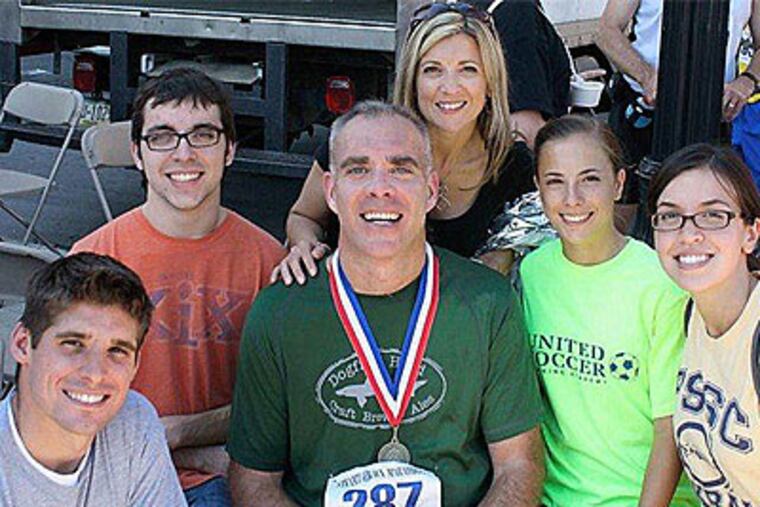Man seeks to outrun his multiple sclerosis
The Inquirer is presenting one profile a day of participants in the May 6 Blue Cross Broad Street Run. See full coverage at www.philly.com/broadstreetrun. By Michael Vitez

The Inquirer is presenting one profile a day of participants in the May 6 Blue Cross Broad Street Run. See full coverage at www.philly.com/broadstreetrun.
When Tim and Susan Burke were dating, 20 years ago, they did a 182-mile bike ride sponsored by the National Multiple Sclerosis Society.
"That was a great opportunity to get to know each other," said Tim, 44, of Clarks Summit, Pa., "but who knew way back then that less than 10 years later, I'd be diagnosed with MS. We joke now that we should have done a 'Powerball' bike ride."
In 1998, with three children, a mortgage, and all the other trappings of a middle-class, two-income family, he started to feel bands of numbness around his chest and abdomen, weakness in his hands, debilitating fatigue, and blurry vision.
He was diagnosed with MS.
Initially, he was in denial. Then anger set in. "Why me? It's not fair!" He began to bargain: "I'll do anything to be able to walk and not become disabled."
Then depression hit. "I'm not going to be able to walk soon," he told himself, "and the quality of my life will be poor, so what's the point?"
These stages of grief are familiar to many. He lived with them for years, with poor outcomes.
"I was weak," he said. "My foot dropped. Fatigue was severe. My eyesight was affected, and I just felt like MS was going to win.
"Then something amazing happened," he said. "I accepted that I have MS, and decided that as my own best advocate, I wasn't going to live with MS. It was going to have to live with me."
He researched. He went to several neurologists, one after another, until he found one who would treat the disease, not just the symptoms.
"And for four years now," he says, "MS hasn't been able to catch me."
As part of his effort to tame his disease, to show it who was in control, he started running.
"I found that running seemed to make me feel good," he said, "and I could do it around my schedule, and my fatigue level."
He started with a 5K, then a 10K, then "stretched it a bit" with a sprint triathlon, a shorter version of the run-swim-bike endurance event.
His wife even learned to swim so she could compete in the triathlon with him. This motivated him all the more.
He ran the Steamtown Marathon in Scranton in 4 hours, 40 minutes.
Running in these races for him is not only a physical act, but a statement, a declaration, that he can live life on his terms with the disease.
He and his family and friends have raised more than $10,000 to fight MS through assorted walks and runs.
He loves Philadelphia and has wanted to run Broad Street for a few years, but registration filled up too fast.
This year, he got in.
"I can't wait," he said.
He can't wait for something else, too.
Symptom-free now for four years, "I can see a day," he said, "when a cure is found and I will be able to benefit from minimal disability and the end of MS."
Contact Michael Vitez at 215-854-5639 or mvitez@phillynews.com, or follow on Twitter @michaelvitez.